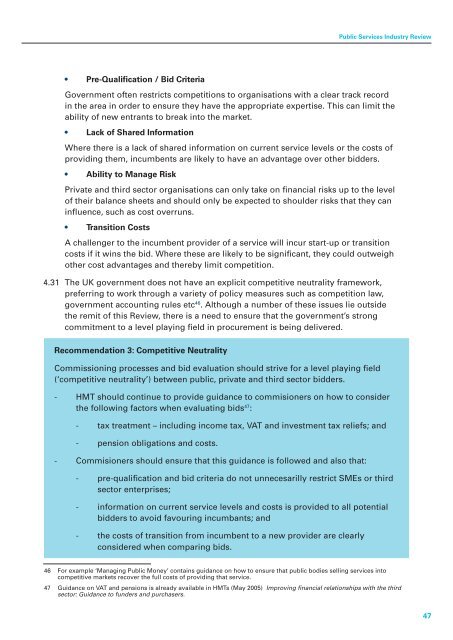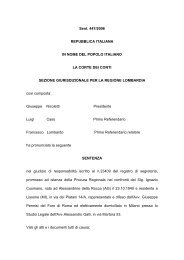Understanding the Public Services Industy
Understanding the Public Services Industy
Understanding the Public Services Industy
Create successful ePaper yourself
Turn your PDF publications into a flip-book with our unique Google optimized e-Paper software.
<strong>Public</strong> <strong>Services</strong> Industry Review<br />
•<br />
Pre-Qualification / Bid Criteria<br />
Government often restricts competitions to organisations with a clear track record<br />
in <strong>the</strong> area in order to ensure <strong>the</strong>y have <strong>the</strong> appropriate expertise. This can limit <strong>the</strong><br />
ability of new entrants to break into <strong>the</strong> market.<br />
•<br />
Lack of Shared Information<br />
Where <strong>the</strong>re is a lack of shared information on current service levels or <strong>the</strong> costs of<br />
providing <strong>the</strong>m, incumbents are likely to have an advantage over o<strong>the</strong>r bidders.<br />
•<br />
Ability to Manage Risk<br />
Private and third sector organisations can only take on financial risks up to <strong>the</strong> level<br />
of <strong>the</strong>ir balance sheets and should only be expected to shoulder risks that <strong>the</strong>y can<br />
influence, such as cost overruns.<br />
•<br />
Transition Costs<br />
A challenger to <strong>the</strong> incumbent provider of a service will incur start-up or transition<br />
costs if it wins <strong>the</strong> bid. Where <strong>the</strong>se are likely to be significant, <strong>the</strong>y could outweigh<br />
o<strong>the</strong>r cost advantages and <strong>the</strong>reby limit competition.<br />
4.31 The UK government does not have an explicit competitive neutrality framework,<br />
preferring to work through a variety of policy measures such as competition law,<br />
government accounting rules etc 46 . Although a number of <strong>the</strong>se issues lie outside<br />
<strong>the</strong> remit of this Review, <strong>the</strong>re is a need to ensure that <strong>the</strong> government’s strong<br />
commitment to a level playing field in procurement is being delivered.<br />
Recommendation 3: Competitive Neutrality<br />
Commissioning processes and bid evaluation should strive for a level playing field<br />
(‘competitive neutrality’) between public, private and third sector bidders.<br />
- HMT should continue to provide guidance to commisioners on how to consider<br />
<strong>the</strong> following factors when evaluating bids 47 :<br />
- tax treatment – including income tax, VAT and investment tax reliefs; and<br />
- pension obligations and costs.<br />
- Commisioners should ensure that this guidance is followed and also that:<br />
- pre-qualification and bid criteria do not unnecesarilly restrict SMEs or third<br />
sector enterprises;<br />
- information on current service levels and costs is provided to all potential<br />
bidders to avoid favouring incumbants; and<br />
- <strong>the</strong> costs of transition from incumbent to a new provider are clearly<br />
considered when comparing bids.<br />
46 For example ‘Managing <strong>Public</strong> Money’ contains guidance on how to ensure that public bodies selling services into<br />
competitive markets recover <strong>the</strong> full costs of providing that service.<br />
47 Guidance on VAT and pensions is already available in HMTs (May 2005) Improving financial relationships with <strong>the</strong> third<br />
sector: Guidance to funders and purchasers.<br />
47
















